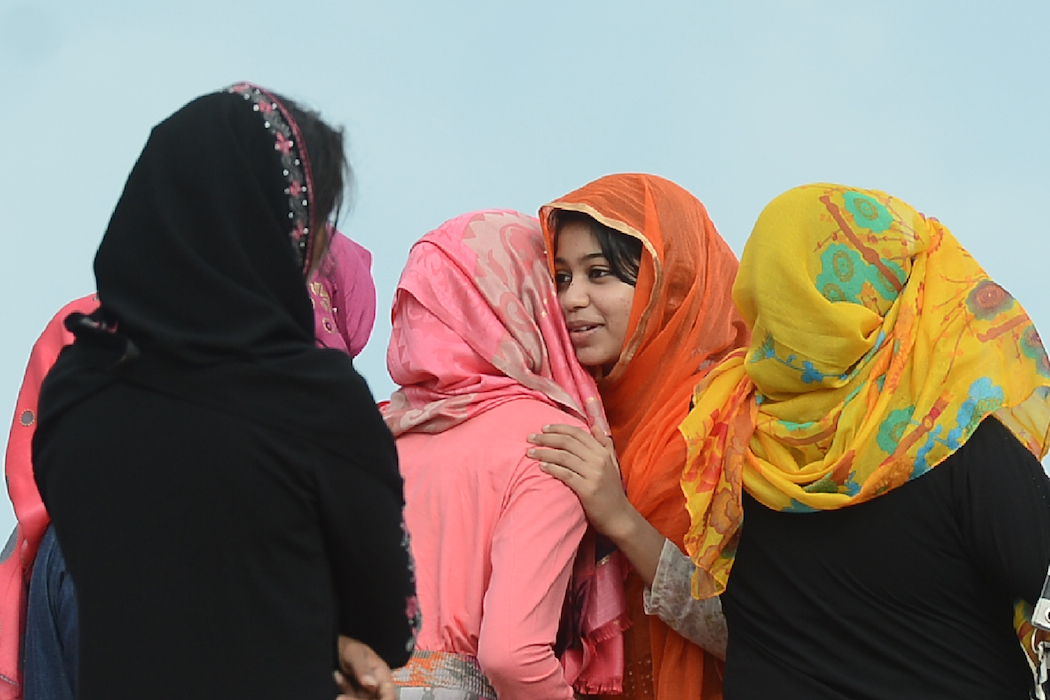Rights groups fear issue could tear communities apart but others see it as isolated incident

Sri Lankan Muslim women offer greetings in this July 2016 file photo. Muslim teachers at a Tamil Hindu ladies college are causing a storm for wearing Muslim attire. (Photo Lakruwan Wanniarachchi/AFP)
ucanews.com reporter, Colombo
Sri Lanka
June 19, 2018
The abaya cloak is at the center of the latest firestorm dividing Muslims and Hindus in Buddhist-majority Sri Lanka as teachers at a Tamil Hindu ladies college clash over religious-tinged wardrobe changes.
Five of the eight Muslim teachers at the Sri Shanmuga Hindu Ladies College sparked controversy in April by wearing the women’s robe-like over-garment to work and civil groups now fear this could damage relations between the communities.
The other three Muslim teachers at the college are male. It welcomed its first Muslim teacher, Fahmitha Ramees, in 2013.
Now the thorny issue that has resurfaced at this national school on the port city of Trincomalee in Sri Lanka’s Eastern Province is at risk of being exploited by other groups to serve their political and religious agendas, according to observers.
Five Muslim women instructors began donning the traditionally black gown, which can be work with a niqab face veil, during classes from April 23 in violation of the school’s dress code.
Previously, school officials say, they respected the practice of Hindu teachers by wearing a sari and headscarf, but in a show of opposition this spring they decided to switch wardrobes, prompting protests from parents.
The Zonal Education Office in conjunction with the education minister for Eastern Province responded by giving the abaya-wearing teachers an ultimatum: Ditch the offending clothing before entering school grounds and wear a sari or be (temporarily) relocated to another school in the district.
R. Sambanthan, a parliamentarian and leader of the opposition, said in a reply to a letter on the matter from Industry Minister Rishard Badurdeen, who is a Muslim, that the college’s dress code must be respected without exception, but that the Muslim teachers could wear whatever they liked once they exit its gates.
After refusing to accept the ultimatum, the five women were transferred to two Muslim schools in Trincomalee pending an official decision on the case.
Forty-year-old Thiyagaraja Sasitharan, a Tamil Hindu whose daughter attends the ladies college, said all teachers should have to obey the school’s rules.
“We respect the cultures of other people but at the same time teachers should not violate the rules,” he told ucanews.com.
“All of the Muslim teachers traditionally wear a saree according to the college’s dress code but one day they started showing up in abaya and this created problems,” he said.
“The Muslims, Hindus and Sinhalese [who are mostly Buddhist] have found a way to coexist here harmoniously,” he added.
“My daughter also studies here alongside many Muslim children but unfortunately now this issue has blown up and gone viral on social media after parents, teachers and former students began protesting against the five teachers’ choices of uniform.”
Sasitharan urged dialogue with the local education department before the situation spirals out of control.
Sri Lanka is still reeling from the wounds of a 26-year civil war between the separatist Tamil Tigers and the military that ended with the former being crushed in 2009.
But critics claim that successive governments over the last decade have continued to pursue racist policies against Muslims.
Now the same tensions are being stoked at the prominent ladies college.
According to Article 12 (2) of Sri Lanka’s constitution, no citizen should be discriminated against on the grounds of race, religion, language, caste, sex, political opinion or place of birth.
However the college, established in 1923, has a mandate to provide its students with an education steeped in Hindu tradition, as stated on its official website.
This would seem to give both camps’ ammunition for their respective arguments in favor of respecting religious freedom.
Activist Mohamed Jihad, a member of the civil rights group Peoples Forum in Muttur, said the rights of the Muslim teachers have been violated and that a complaint has already been filed with the Human Rights Commission of Sri Lanka.
“Muslims always respect other cultures and the teachers should be allowed to dress in accord with their religious beliefs,” he told ucanews.com.
“There are many Hindus teaching at Muslim schools in the country and they are free to wear saris, but the same courtesy [choice of wardrobe] is not extended to Muslim students at Hindu or Tamil schools,” he said.
“I condemn this attack on Muslim teachers at Sri Shanmuga. Incidents like this, as well as the recent attacks on the Muslim community, hint at darker forces operating behind the scenes with hidden political agendas,” he added.
Majeed Ikrima, another rights activist from Kinniya town in Trincomalee who works with a group called Call for Open Dialogue, said teachers from both camps had dealt with the situation badly and should own up to their mistakes.
He encouraged them to engage in open dialogue to make the nation’s multi-ethnic society more harmonious and peaceful based on greater religious tolerance.
“Both of them made mistakes and should try to find a middle ground,” he said, adding that he thought the issue had been overblown by the media.
“This was an isolated incident and it hasn’t really sown that much division between the two communities,” he added.
“We met with representatives from both sides after this issue first erupted and analyzed what had happened but we couldn’t find any evidence of racism or persecution — at least not in the beginning.”
He said the situation escalated later as Hindu protesters began writing racist slogans on placards targeting the four female Muslim teachers and their choice of clothing.
“That kind of thing was, and is, unacceptable,” Ikrima said.
“Both communities must remain vigilant so this kind of thing doesn’t happen again.”
